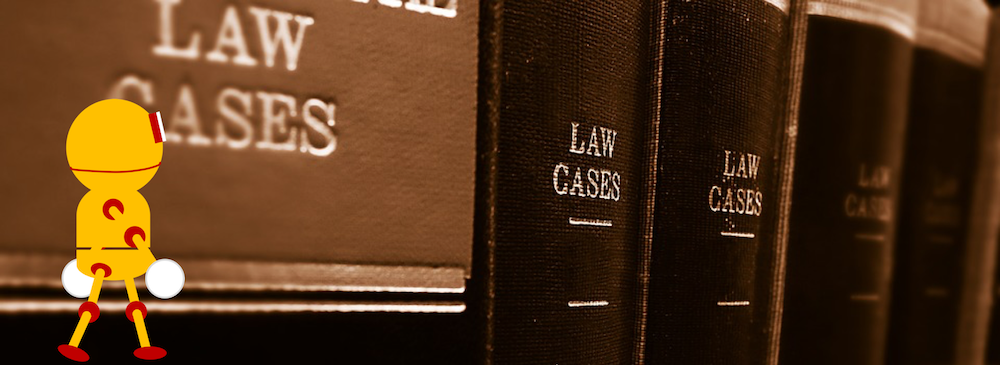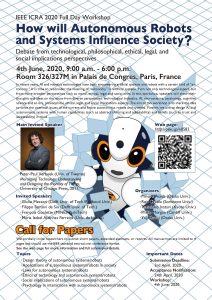This workshop has finished. Thank you for your participation. The video recording was released here.
Contents
NOTICE
In light of COVID-19, this workshop will be held virtually on the morning of June 4th, 2020. Attendance to the virtual workshop is free of charge. Please register here for participation.
We will publish a video recording of the workshop on YouTube. Webinar registrants will be informed about the video release after the workshop.
This workshop will be held in IEEE ICRA 2020.
- Date: Half day workshop, June 4th, 2020, 9:00 a.m. -
6:00 p.m.12:00 p.m. (Central European Time) - Place:
Room 326/327M in Palais de Congres, Paris, FranceZoom Webinar - Fee: Free of charge
- Registration:
Here[Closed]
Recent rapid progresses of autonomous robots and AI have been changing our lives not simply with higher capabilities in many functions, but rather in ways of interactions between humans and machines. In such situations, the meaning of autonomy in artificial systems may cause over-expectation or sometimes misunderstanding for robots’ capabilities. It’s time to reconsider the meaning of “autonomy” in artificial systems from not only technological aspect, but from more broader perspectives such as moral, ethical, legal and social ones. In this workshop, first, the invited speaker, Prof. Peter-Paul Verbeek, the author of the book entitled “Moralizing Technology: Understanding and Designing the Morality of Things” will show several issues on how autonomous robots and systems influence society. Then, other speakers will show their thoughts and ideas on the issues from diverse perspectives: technological (robotics, AI, neuroscience, psychology, cognitive science and so on), philosophical, ethical, legal, and social implications aspects. The aim of this workshop is to share the idea to solve the potential issues of the current and future autonomous robots and systems. Further, we aim to design AI and autonomous systems with human capabilities (such as abstract thinking and adaptability) and beliefs (such as trust and acceptability) in mind. Because the issues are so broad, we will call for papers to fill the gap and to enrich the discussions.
Flyer
Aims
In recent years, AI and robotics technologies have been empowering artificial systems and robots with a certain kind of autonomy. Such quasi-autonomous systems may behave in ways beyond their designers’ expectations, just like children starting to become independent from their parents. Such situations may affect our society so much in different ways. Fundamental questions are:
- To what extent does increasing machine autonomy affect morality and ethics?
- What's a new relationship between humans and advanced robots and AI systems?
- How will moral and ethical issues change to adapt with these technical advancements?
- Can the current legal systems handle the accidents caused by human-machine interactions?
- What are social risks in a symbiotic society with them?
In this workshop, we discuss these issues from diverse perspectives: technological (robotics, AI, neuroscience, psychology, cognitive science and so on), philosophical, ethical, legal, and social implications aspects. Further, we aim to design AI and autonomous systems with human capabilities (such as abstract thinking and adaptability)and values (such as trust and acceptability) in mind.
Main Invited Speaker
Other Invited Speakers except Organizers
- Giulio Mecacci (Delft University of Technology / Radboud University)
- François Goulette (MINES ParisTech)
- Maria Isabel Aldinhas Ferreira (Universidade de Lisboa) [CANCELED]
Call for Contributed Papers
We cordially invite researchers to submit short papers, extended abstracts, or reports. Submitted contributions can describe work in progress, preliminary results, novel concepts, or applications in industry. WS allocated 5 slots for the contributed papers.
All manuscripts are limited to 4 pages and should use the IEEE standard two-column conference format [Latex, MS Word]. Please submit your paper via Microsoft Conference Management Toolkit (CMT) [CLOSED].
Important Dates
- Submission Deadline:
April 3, 2020, 23:59 ESTApril 19, 2020, 23:59 EST [EXTENDED] - Acceptance Notification: April 24, 2020
- Workshop: June 4, 2020
Program [Confirm]
Session 1: Technology & Autonomy
9:00 - 9:15 Minoru Asada
"Opening key note address: Autonomy in machines and humans"
9:15 - 9:30 Raja Chatila
"Why endowing machines with legal personality is not technically grounded and is morally flawed"
Session 2: Technology & Ethics
9:30 - 9:45 Phillip Morgan
"Risk assessing robots and AI through what about humans? Challenges and opportunities in developing safe and secure cyber systems"
9:45 - 10:00 Giulio Mecacci
"Varieties of responsibility gap with autonomous system"
10:00 - 10:15 Discussion 1
Session 3: Social Impact
10:15 - 10:45 Peter-Paul Verbeek
"On human agents and artificial agents: robotics, artificial intelligence, and the human condition"
10:45 - 11:00 François Goulette
"Is the "trolley dilemma" an ill-posed problem?"
Session 4: Humans and Law
11:00 - 11:15 Tatsuhiko Inatani
"The rule of law after humanism"
11:15 - 11:30 Dylan Jones
"Thought, systems thinking, critique of game theory, blame and trust"
11:30 - 12:00 Discussion 2








